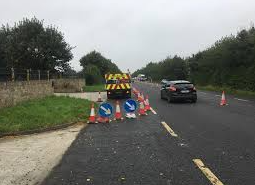
Recovery operations focus on repairing damage, supporting affected communities, and addressing power cuts across Ireland
Recovery efforts are currently underway following the severe impact of Storm Debi, which caused widespread damage across Ireland, including power outages, coastal flooding, and transport disruptions. The storm led to the closure of several schools and the disruption of public transport, with significant delays in deliveries due to hazardous road conditions.
One of the most severe incidents occurred in County Limerick, where a postwoman was taken to hospital after being struck by flying debris. However, her injuries were not life-threatening. The storm caused power outages across much of the country, with approximately 70,000 homes and businesses left without electricity at the peak of the disruption. The Electricity Supply Board (ESB) has been working tirelessly to restore power, but as of Monday evening, around 34,000 customers were still affected.
Storm Debi also led to coastal flooding in Galway, where a boat was washed off its moorings and a sea wall was knocked over in Oranmore. Galway city and its surrounding areas were particularly hard hit, with flooding damage causing business owners to estimate repair costs ranging between €500,000 and €700,000. Taoiseach Leo Varadkar expressed his sympathies for those affected, assuring that the Government would expand an enterprise support scheme to assist businesses in the region.
Across the country, reports of fallen trees, flooding, and damaged power lines were widespread. In Meath, fire crews responded to multiple incidents involving vehicles and fallen trees, though no injuries were reported. Local authorities, alongside ESB crews, are continuing to clear debris from roads and work on restoring power.
Transport was heavily impacted, with disruptions at Dublin Airport and across Dublin’s bus and tram services, which had to be temporarily halted. The Irish Rail network imposed a speed limit of 50kph as a precaution due to the high winds.
Minister for Social Protection, Heather Humphreys, announced the extension of the Humanitarian Assistance Scheme to other areas affected by the storm, particularly in Galway, where flooding had caused significant disruption for individuals and families. Junior Minister Patrick O’Donovan urged the public to avoid fallen trees on roads, warning of the potential dangers posed by power lines entangled in the debris.
Storm Debi is the fourth major storm to impact Ireland since September, following Storms Babet and Ciaran, which caused severe flooding in several areas. According to Keith Leonard, the national director for fire and emergency management, Storm Debi is considered the most intense of the season so far, largely due to the powerful winds that accompanied the storm’s leading edge.
In Northern Ireland, yellow and amber wind and rain warnings were issued, with public transport affected and around 2,000 customers left without power, particularly in the counties of Down, Armagh, and Craigavon.












